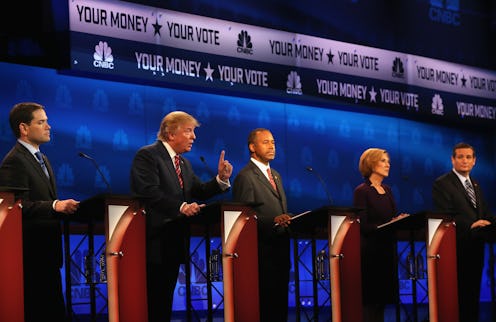News
The GOP Debate Needs To Talk About Police Reform
Only one Republican presidential candidate has answered a specific question about police reform or police brutality throughout any of the three GOP debates, and that candidate has since dropped out of the presidential race. In response to a question about police "targeting young African Americans" during the first GOP debate, Wisconsin Gov. Scott Walker said that we should properly train law enforcement officers who might use deadly force, according to Think Progress. He didn't elaborate or say what changes should be made to training programs, and none of the other candidates have since answered similar questions. The fourth GOP debate needs to address police reform and the incidents of police brutality that have captured media attention for the past year.
The Black Lives Matter movement has drawn attention to the dozens of unarmed, often young, black people who were killed at the hands of police in the last year, even though the issue hasn't been going on for just the last year. A Guardian investigation found that 972 people died at the hands of police this year. Of that number 192 were unarmed. Over the summer, the Guardian found that 30.5 percent of black people killed were unarmed, while 16.1 percent of white people killed were unarmed. That disparity is something the candidates should be talking about.
They should be talking about how to eliminate or minimize the number of unarmed people killed, or what they would do to help solve racial biases in criminal justice systems. Because that deadly use of force against an unarmed person that an officer deems a threat is being used disproportionately in other instances as well. For example, 26 percent of people killed by police had some sort of mental illness, according to the Guardian. Someone tasked with protecting U.S. citizens should know how to incapacitate an assailant without killing him or her, and the candidates need to address what that would mean for police training.
Further, abuses of power haven't only occurred when officers use deadly force. In a separate investigation of police abuse of power, the Associated Press found that hundreds of law enforcement officers lost their badges over sex-related misconduct or from being involved in sex crimes and sex criminal rings. And, another study by the Urban Institute found that LGBT homeless youth who participated in what's called survival sex reported being abused by police officers when they were questioned or arrested.
These are the kinds of abuse of power issues that the candidates also need to address. The Black Lives Matter movement highlights a group of people who are disproportionately killed by police officers, revealing issues concerning race, police and community relations, and police training that need to be addressed as soon as possible and in police precincts across the U.S.
But what it also reveals is a bigger issue with law enforcement: that police officers do abuse their power, and though those officers may be the few "bad apples," they are corrupting the justice system and the trust that people ought to have in law enforcement. Because so many demographic groups have experienced instances where officers used their power for exploitation or used it excessively, it's clearly an issue that merits more than one minute of time, which is how much it received during the first GOP debate. In subsequent debates, Black Lives Matter or police reform, generally, didn't receive any time.
The fourth GOP debate needs to address specific officer training in mental health, diversity, and LGBT issues. Candidates should also describe how departments should overhaul their recruiting and hiring programs to weed out people with racial biases. Platforms on police reform should be specific enough that they say how the would increase penalties for officers accused of sexual misconduct so that the cases don't get swept under the rug. These specific issues probably won't be mentioned at the debate. But if the candidates can't at least address disproportionate police brutality against black people, then it will seem as though the issue isn't something they intend to address if elected.
